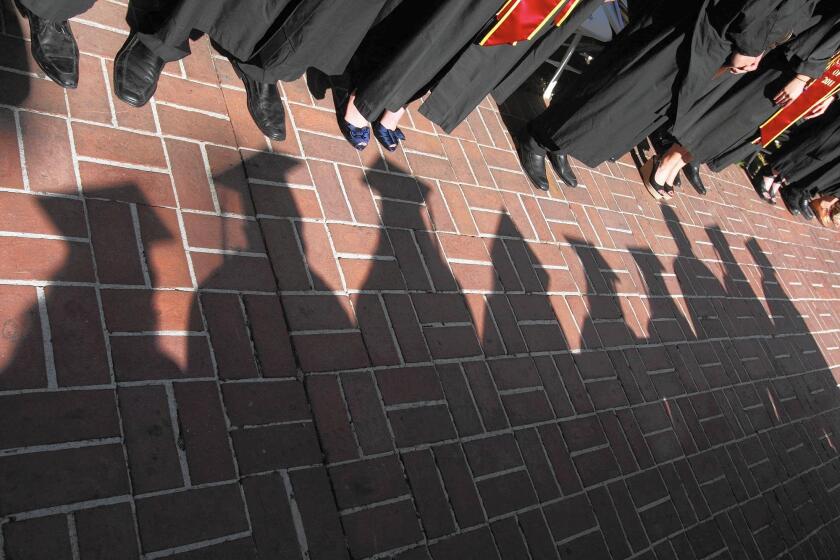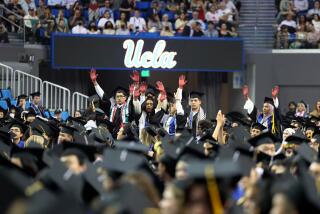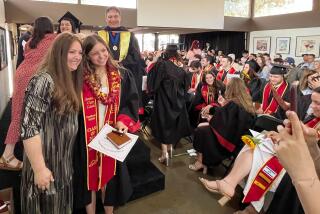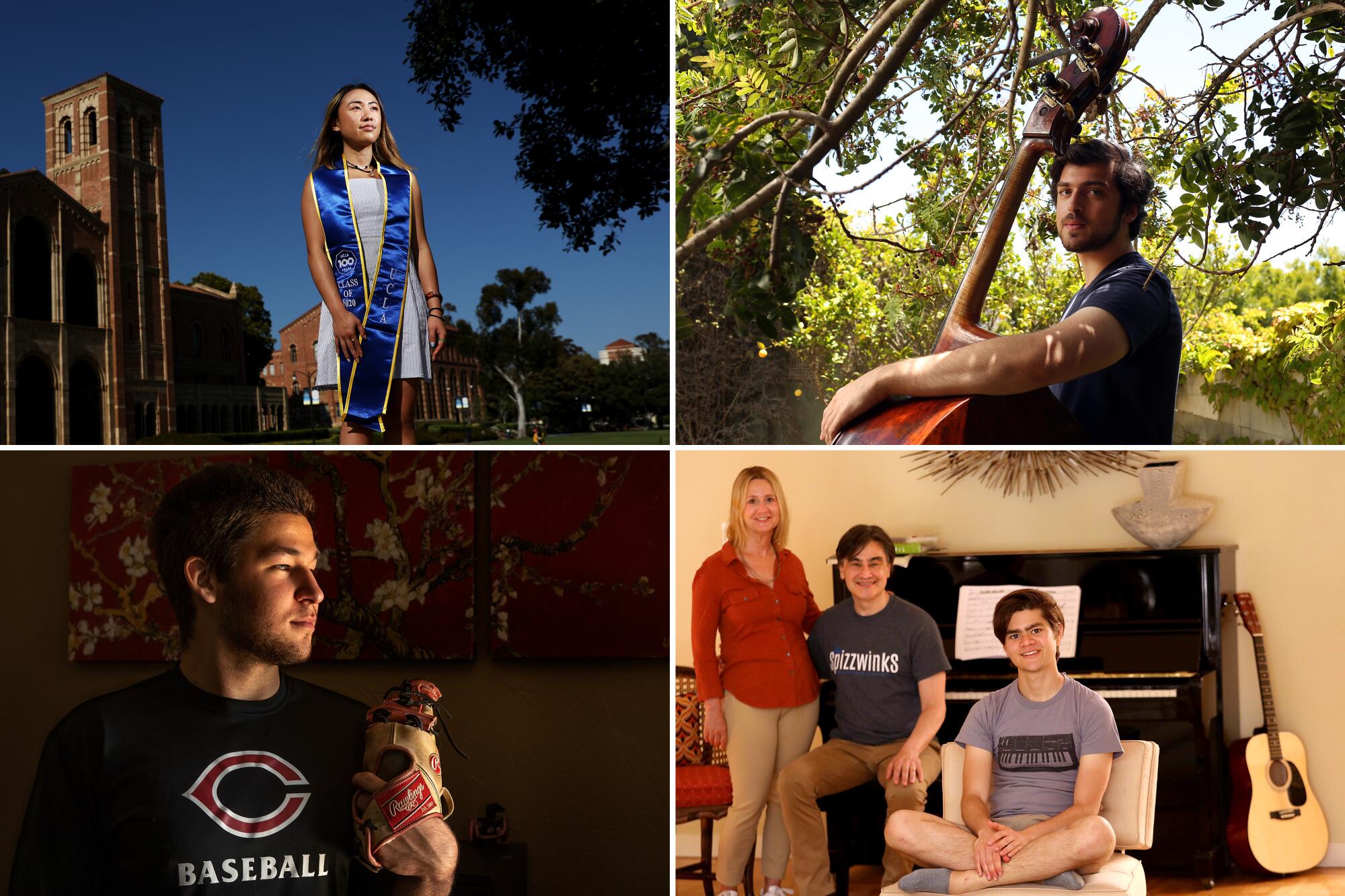
- Share via
Alec Garcia and 20 other freshmen stepped onto the baseball field at Grover Cleveland Charter High School in Reseda for the first time in June 2016. The grass was crunchy and yellow; the dirt, dangerous and unforgiving, chopped into uneven shards from the stampede of weekend soccer games.
But the freshman class was talented — and the players were already anticipating a strong senior season, mentally circling March 2020.
For the record:
9:16 a.m. May 9, 2020An earlier version of this article said Erika Kerekes’ older son was valedictorian at his high school. He was salutatorian.
“Since our freshman year, we were like, ‘Man, when we’re seniors we’re going to be really good,’” Alec said.
Over the next four years, they played year-round and became family. Thanks to head coach Sid Lopez and a motivated group of parents, the quality of the field — new sod, new bleachers, new clubhouse — began to mirror that of the team. In two of the last three seasons, Cleveland advanced to the city semifinals. With 14 seniors this year, the Cavaliers had a realistic shot at the L.A. City Section title game, which was to be played at Dodger Stadium.
Alec, a three-year varsity player, had developed into one of the team’s most reliable performers. He was a good student, with a 3.4 grade-point average in Cleveland’s demanding CORE magnet program, but he wasn’t a slam-dunk prospect for a college scholarship. A strong spring could cement his future.
“I don’t want to say that I was riding on baseball for college,” Alec said from his Encino home, “but I put a lot of effort into [it], hoping that I could get a scholarship.”
After L.A. Unified schools shut down, Alec improvised to stay in shape. “I was trying to be optimistic and have hope that we would get back into things — even if we came back in mid- to late May,” he said, “because my whole life has been school and baseball, you know? And not having either of them….” His voice trails off.
“These 14 young men have worked so hard for four years to be where they are, and they were in a great position to compete,” Lopez said.
“It was something that was taken away from them.”
Canceled milestones leave ‘a big hole’
The coronavirus outbreak has disrupted the foundations of daily life. For the high school and college classes of 2020 — and their families — the catastrophe has left a large, empty space where signature coming-of-age moments should be.
Graduation speeches and senior projects; interviews and internships; grad nights and proms and spring sports banquets — all gone, replaced by the monotonous limbo of self-isolation and a spooky uncertainty: What now? What next? When?
Seniors everywhere have lost their bearings.
For years, focusing on academics gave San Pedro High School senior Skye Carbajal a sense of control and comfort. Her life outside school had been turbulent. She was put in the foster system and placed with her grandmother, Liz McConnachie, in ninth grade — and the classroom became her sanctuary.
Skye’s senior-year schedule started at 7 a.m. and included Advanced Placement classes, college courses, violin lessons and volunteer work through her local Boys and Girls Club. She earned the second-highest GPA in her class and in the fall will attend Pomona College on a full ride. In her graduation speech, she planned to thank her grandmother, who was “going to record it and listen to it every morning.”
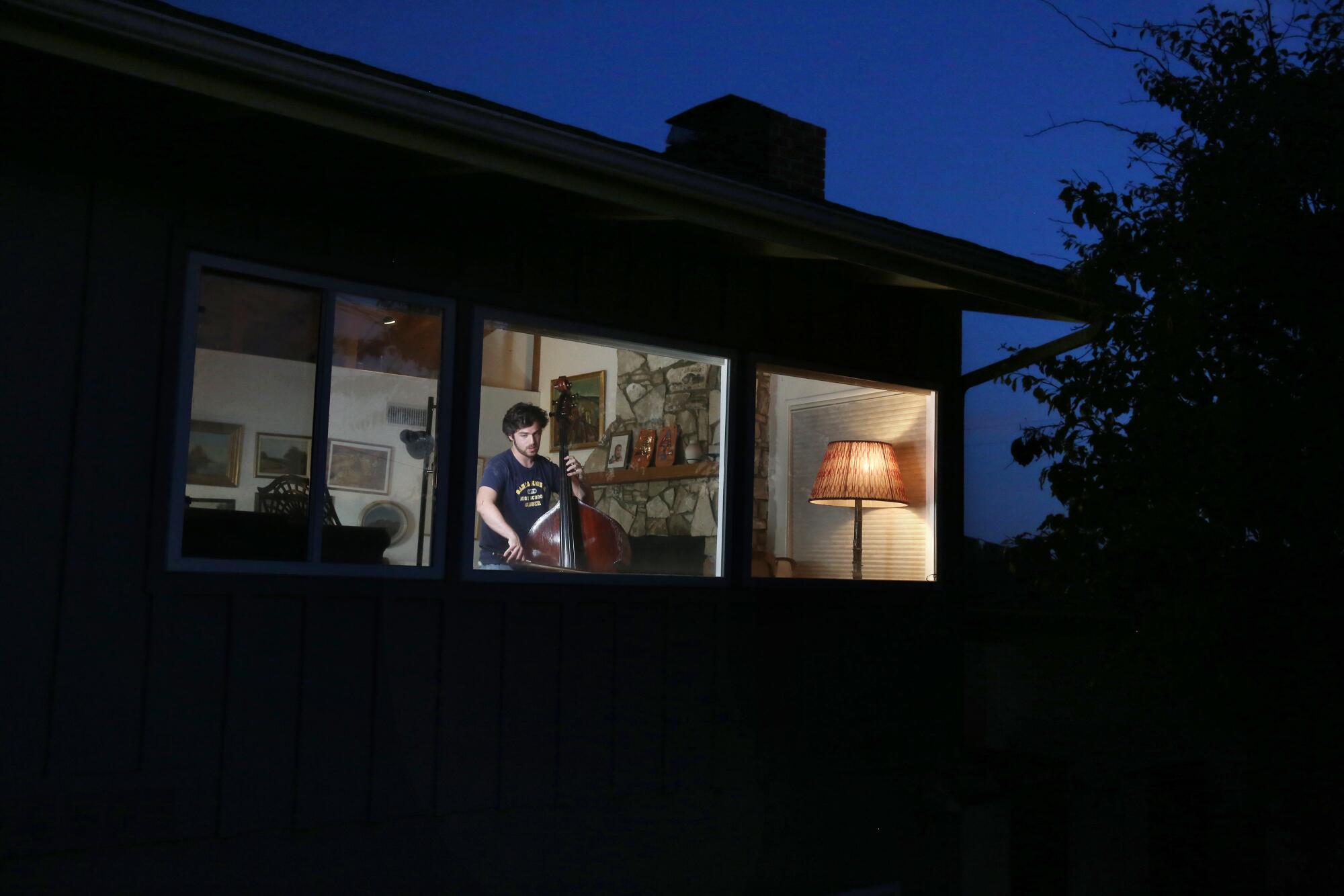
Weston Kerekes, a member of Santa Monica High School’s symphony orchestra, had been practicing the bass in preparation for a spring appearance at the Royal Concertgebouw in Amsterdam and the Berliner Philharmonie in Berlin. The orchestra had been planning to perform Beethoven’s complete Fifth Symphony. Instead, Weston found himself sitting at home, teaching himself how to whittle and paint.
Though Weston, a leading contender for valedictorian, expressed a vague disappointment about not experiencing “that kind of final kumbaya when we’re all getting together and being happy and whatever,” he was calmly pragmatic about the sudden change in plans. In fact, he’s quickly pivoted toward what’s ahead: his freshman year at Yale.
“My head’s already there a little bit, so that’s how I’m dealing with not having all that finality.”
Weston’s mother, Erika, had a different perspective and stands as a reminder that the sudden cancellation of senior-year rituals may hit parents harder than their children.
She lamented the lost rites, particularly because her older son — a junior music major at Yale and former Santa Monica salutatorian — got to have all of those experiences. “It feels like there’s just going to be a big hole in that photo album for Weston,” she said.
Guadalupe Gomez is the mother of Culver City High School senior Diana Martinez, who turned a lifelong Lego fixation into an interest in engineering. Diana was scheduled to attend a robotics competition in Michigan at the end of April. It was canceled, as was the upcoming event she was most excited about — her graduation ceremony
Diana’s parents immigrated to the U.S. from Oaxaca, Mexico, and she’s the first in the family to finish high school. “We all worked very hard to get her where she is,” said Gomez, speaking through an interpreter. “And now this happens.”
Diana and her family aren’t just disappointed, they’re worried. Diana was accepted into the mechanical engineering program at San Jose State. But when the shutdown started, her father, Arturo Martinez, a chef, lost his job, and Gomez’s hours as a housekeeper were severely cut.
“We’re stumped,” Gomez said. “What are we supposed to do now? We don’t really have the funds.”
Graduating into a world in turmoil
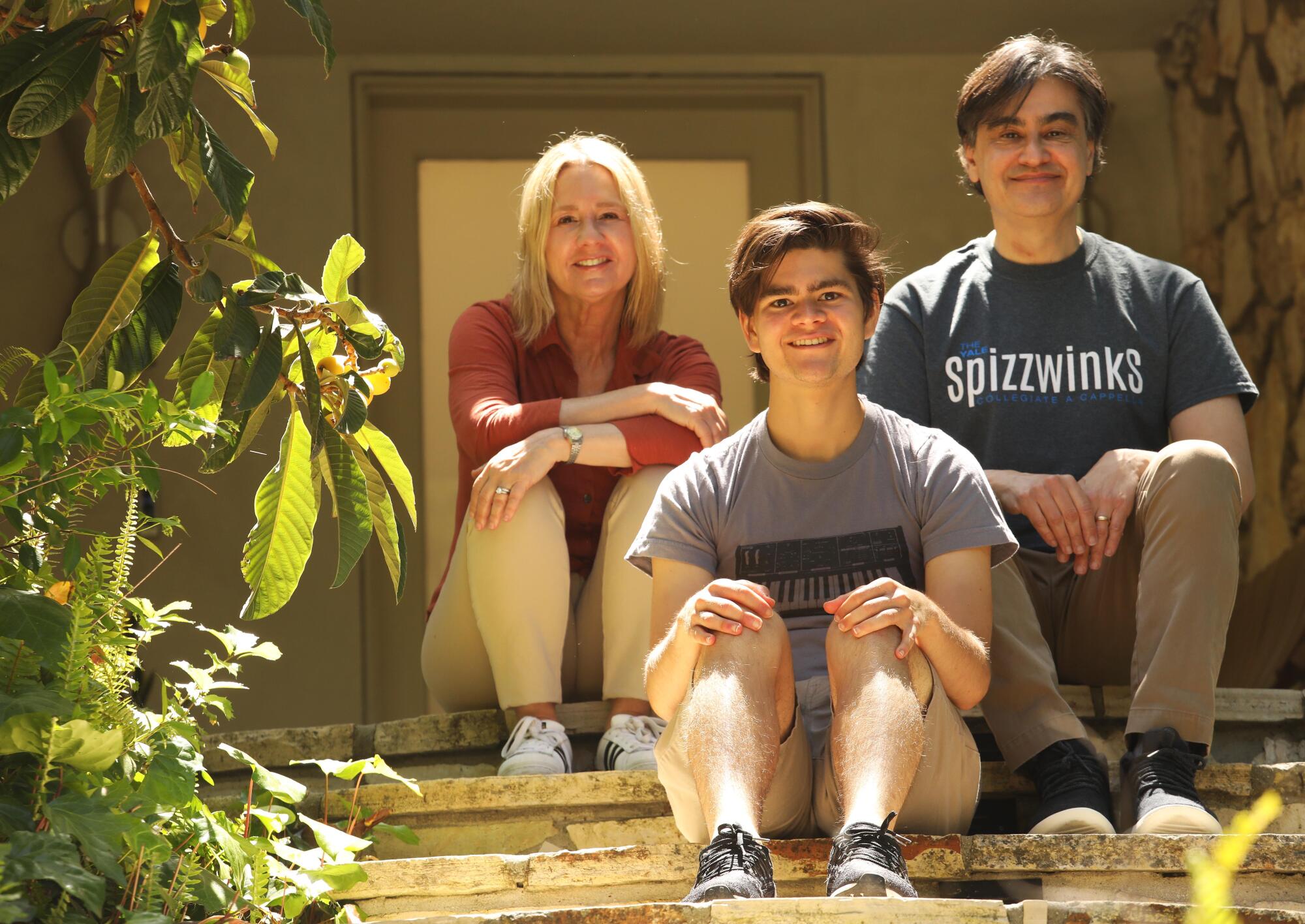
For high school seniors with college in their sights, the final events before graduation are supposed to be a reward for a 13-year grind. They’re a reward for college seniors as well, but many of those students have been participating in another kind of ritual: the launch of their careers. Now, projects and plans have been thrown out the window, leaving soon-to-be graduates scrambling in place.
Dylan Schifrin, a music major at Yale, started writing and composing an original musical as a sophomore. He completed “Y2K: A Survivalist Musical” for his senior thesis in the fall and recruited close to 50 fellow students to volunteer as cast, crew and orchestra members in a production that was set to open on campus April 2 — his 22nd birthday.
“It was going to be my capstone experience,” Schifrin said.
It also would have offered him an entree into the world of professional musical theater. Schifrin planned to invite industry contacts he knew, including “Book of Mormon” writer Robert Lopez, and recordings of the production would have provided samples to share with theaters in New York City, where he hoped to start a career.
The loss of both the production and graduation hit his parents particularly hard. Schifrin, an only child, has studied music since he was 4. His parents refinanced the mortgage on their Sherman Oaks home to help pay for his Ivy League education. They’d booked their flights and hotel rooms for both events months ago.
“It was heartbreaking for us,” said Schifrin’s mother, Lissa Kapstrom. “It’s been a 22-year journey that we’ve been there for the whole time. This was supposed to be a culmination.”
For Leticia Mejia, an immigrant from Honduras, her son’s graduation would have looked different but been no less important.
Victor Rojas, who was born with brittle bone disease and has been in a wheelchair most of his life, started at Cal State Northridge in 2014. He almost came undone during his freshman year when his father, who had cancer, died of complications from a routine biopsy. Rojas was lost, attending classes but mentally checked out. “I started partying; I started doing drugs, drinking,” he said.
He was placed on academic probation and lost his financial aid — but a family friend helped him get back on track. Rojas will complete his studies this month.
Mejia, who stopped her schooling after the sixth grade, had been planning to have a dress made in Honduras for the occasion. The family was going to celebrate at a restaurant, maybe Olive Garden, afterward.
Now the graduation has been postponed until at least late 2020. Mejia canceled the dress order. She still hopes to see Rojas graduate, though, and to enjoy a celebratory dinner — even if it’s only at home.
“He deserves it,” she said.
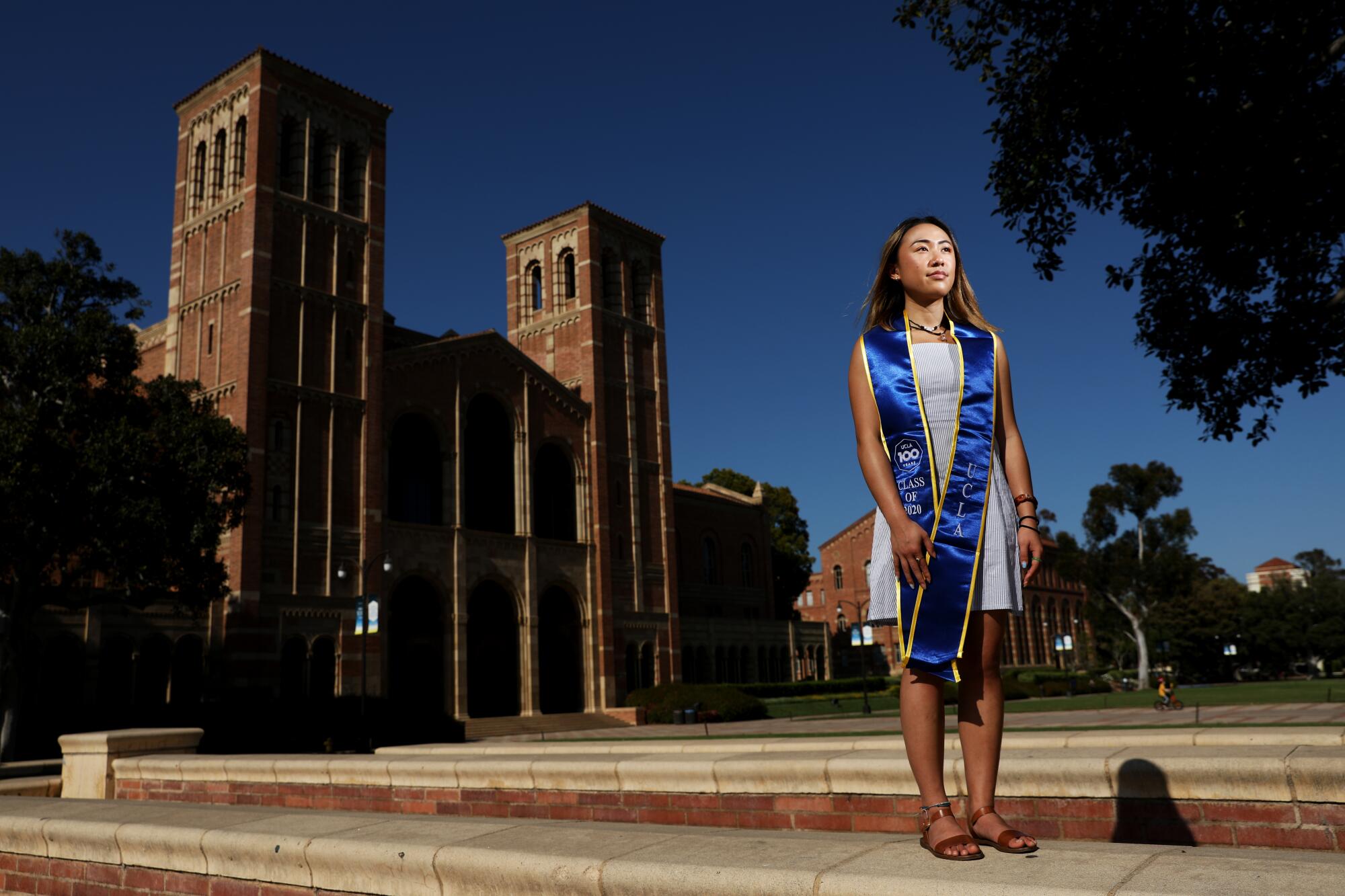
Christine Tran, a UCLA senior, was looking forward to graduation and certain traditions associated with it — perhaps most significant, dipping her hand in the inverted fountain, a campus landmark. UCLA students are initiated at the fountain their freshman year and told not to touch it again before graduation, lest it add an extra quarter to their undergraduate careers.
But she also wanted to show her parents what she has accomplished and to let them know their sacrifices have mattered.
“Seeing thousands of other students,” Tran said, “ would signal something to them that this is a really big thing my daughter did, to graduate from here.”
Her parents, who emigrated from Vietnam after the war, had been working as a carpenter and a seamstress in El Monte. Both of them lost their jobs after the pandemic started and the economy tanked. Now Tran, who works as a law clerk at UCLA, is the only income earner in her family of five. She had to double her weekly hours, from 10 to 20, and cut short work on her honors thesis about cultural perceptions around domestic violence.
Recently, Tran was offered a Fulbright fellowship to teach in Vietnam — a dream job — but now she’s waiting to hear from a U.S.-based fellowship that would keep her closer to home.
“Even if I do get these post-grad opportunities I’ve been dreaming of, maybe I can’t take them because I need to support my family first and it would feel selfish to just leave,” she said.
The ending of the script we associate with hard work, personal sacrifices and fastidious planning has been rewritten.
Samir Al-Alami, a senior at UC Riverside, had already said his goodbyes to campus life. On March 6, the political science major got together with friends outside his apartment complex to play soccer and eat shish kebab. They were celebrating the end of winter quarter and bidding Al-Alami farewell before he headed to Washington, D.C., for the University of California’s UCDC program.
He’d carefully mapped out his undergraduate plans so he could spend his last quarter in Washington. He had an internship lined up with Rep. Mark Takano (D-Riverside) and hoped to build connections that he could parlay into a job in public policy after graduating. And Al-Alami, the son of Palestinian immigrants, was looking forward to fasting for Ramadan with a new community of Muslims.
But the University of California canceled Al-Alami’s program — 13 days before it was scheduled to start. He lost his internship. His last hope, a fellowship that would assign him to a local government job in Riverside, has put the review of applications on hold.
“I really truly don’t know what I’m going to do,” he said. “Every single one of the plans I made and all of the backups have failed.”
Fleeting moments of happiness
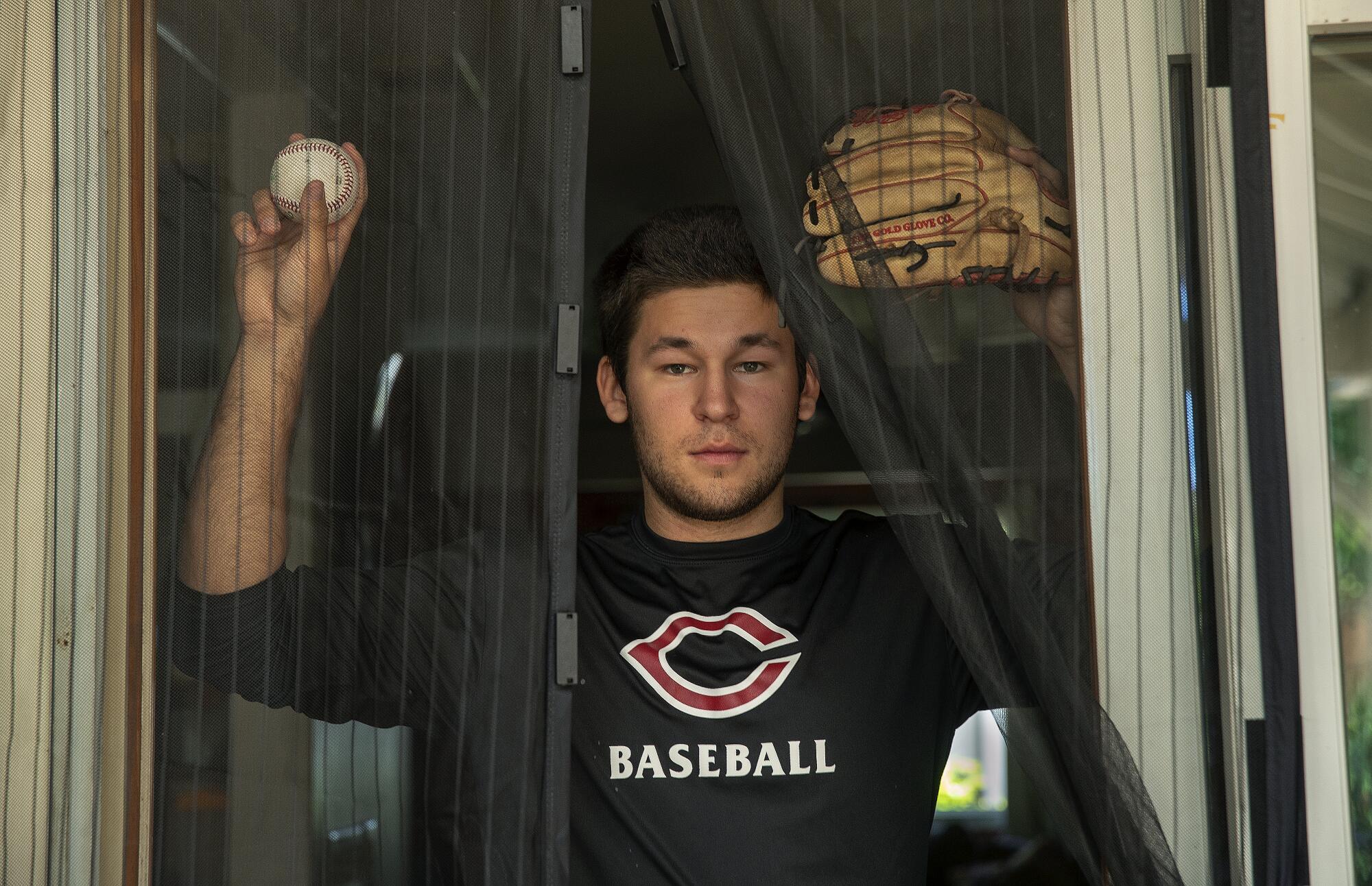
Alec Garcia continues to be reminded that his senior year didn’t end the way he had imagined. At the moment, he is thinking about enrolling at Glendale Community College and playing baseball there to get the attention of a Division 1 university.
A few weeks ago, he received word that the school yearbook wanted a baseball team “photo.” But instead of a group shot on the field, this year, each player had to be photographed alone, at home, in uniform. “That was just another time where it hit me that it’s over, and there might not be another chance for us to take pictures of the team,” he said. “It’s really weird.”
As Alec posed against a wall in his living room, he considered his shoulder-length hair, which he believed was inexorably linked to his team’s success.
“His hair was everything,” said his mother, Geraldina Garcia. “He’d say, ‘I’m winning, and I cannot cut it.’”
But her son was no longer winning his games. He was disoriented about the abrupt end of high school and his baseball family. “His whole world has been turned upside down,” said his father, Salvador Garcia. “I think it was less about not playing baseball and more about belonging to a team. Whatever might have happened, he still treasured being part of a team.”
After a burst of anger during a family dinner, Salvador Garcia spoke to his son, hoping to make some sense of a world that has been upended.
Because of the outbreak, Salvador Garcia explained, nothing would be the same going forward — even if Alec were allowed to finish his senior year. “I don’t know if it gave him solace or some kind of warmth knowing that the change was going to happen anyway, but right after we finished talking, he cut his hair. He said, ‘I’m pumped.’ For that moment, he was happy.”
“That was the biggest heart-to-heart I had with my dad,” Alec said. “I was just thinking about my hair, and honestly, I had it for other people. It was annoying to wash it, and it took forever to dry, but people remembered me for the hair. So I kept it. Now I was going to do what was best for me. So that night I was like, ‘I’m going to buzz my hair.’”
During the Cleveland baseball team’s Zoom meeting the next day, much of the discussion revolved around Garcia’s shorn locks. Soon after, many of his teammates followed suit, shaving their heads in solidarity. “For that moment,” Salvador Garcia said, “they were a team again.”
The coronavirus outbreak makes finding jobs more difficult for everyone. College seniors face unique career challenges.
More to Read
Sign up for Essential California
The most important California stories and recommendations in your inbox every morning.
You may occasionally receive promotional content from the Los Angeles Times.
